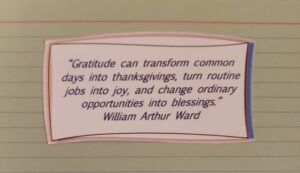I don’t know about you, but among the many things I’m grateful for are tools. Duct tape, an electric screwdriver, and a set of diamond drill bits are among my BFFs. And, don’t get me started on how much I love my Sawzall—no overgrown tree on my property is safe!
So whenever I start something new—a new job, a new book, a new DIY project—I look for the appropriate tools that will help me succeed.
We all know the saying, “Use the right tool for the right job.” Thomas Carlyle even went so far as to declare, “Man is a tool-using animal. Without tools, he is nothing. With tools, he is all.”
Look out Home Depot, here I come!
Nearly 35 years ago when I embarked on my sobriety journey, I approached this “project” in the same way: I looked for tools I could use that would help me get sober and, more importantly, stay sober. Because, after all, what’s the point of building a barn only to have it fall down because I used the wrong tools?
“The greatest enemies of us alcoholics are resentment, jealousy, envy, frustration, and fear. When [these feelings] come, stop and count your blessings.” The Big Book of Alcoholics Anonymous
When I first got sober, these “greatest enemies” were the only feelings I recognized. So I knew right away that I would need a really powerful tool in my spiritual toolkit if I was going to have any hope at getting and staying sober. And that tool was the Gratitude List.
But exactly why is a Gratitude List so important?
Because when you are in the midst of emotionally paralyzing, negative feelings, you literally can’t think clearly. On the other hand, when you are in the midst of gratitude, you literally can’t conceive of negative emotions, let alone feel them. Or, as M.J. Ryan succinctly put it, “Whenever we are appreciative, we are filled with a sense of well-being and swept up by the feeling of joy.”
Knowing that negative feelings can cloud clear thinking, my AA sponsor encouraged (okay, actually demanded) that I write down what I was most grateful for on a 3×5 card and keep the card with me at all times. That way, whenever the negative thoughts and emotions threatened my serenity or my sobriety, I could pull out that little card, read over everything I had written down, and remind myself of the many blessings I did have as a result of just not taking that one drink again.
And so I dutifully wrote down the things I was grateful for, and I kept my 3×5 index card always at the ready—and believe me, I pulled that little lifesaving tool out of my spiritual toolkit dozens of times in the first year of my sobriety, and countless times since then.
Gratitude shifts your focus from what your life lacks to the abundance that is already present. In addition, research has shown that giving thanks makes people happier and more resilient, strengthens relationships, improves health, and reduces stress.
Wow—all that from one little 3×5 card? What’s not to be grateful for?
William A. Ward said, “God gave you a gift of 86,400 seconds today. Have you used one to say ‘thank you?’”
Do you fleetingly think about what you are thankful for? Or does your gratitude extend beyond a single day? And how might practicing gratitude and giving thanks for everything transform your “common days into thanksgivings” each and every day?

